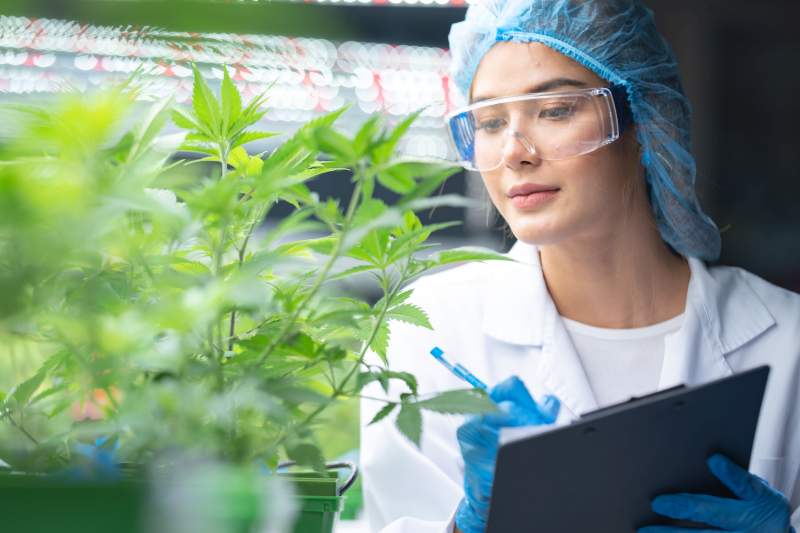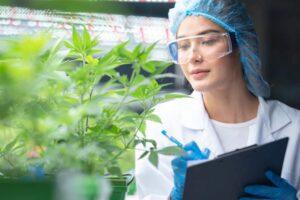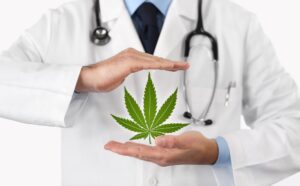Discovering new cannabinoids is an exciting event in cannabis research. Just when it seems that after decades everything has already been uncovered, suddenly new findings emerge that surprise the world. A prime example of such an event is undoubtedly the discovery of THCP, or tetrahydrocannabiphorol. Learn more about this subject and get to know the properties, applications, and effects of THCP.
Table of Contents:
What is THCP?
THCP stands for tetrahydrocannabiphorol. It is a cannabinoid discovered during laboratory research on an Italian variety of medical marijuana in 2019. Information about it was presented by Italian laboratory researchers in the journal Nature, where they described what THCP actually is and its impact on the human body.
THCP has a structure similar to the well-known and popular cannabinoid THC. The main difference is the presence of additional carbon atoms in the alkyl side chain – which means for potential consumers that the effects of THCP will be stronger than those of psychoactive THC. Moreover, in the article about THCP in the journal Nature, scientists indicate that the potency of THCP can be up to 30 times greater in producing psychoactive changes compared to THC.
Example: If a medical marijuana patient requires a dose of 220 mg of pure THC during therapy (e.g., 1 gram of a strain with 22% THC content, available from products like S-Lab or Aurora), using THCP products could satisfy their need with just 7 mg of pure THCP (i.e., 0.01 gram of a preparation with 7% concentration).
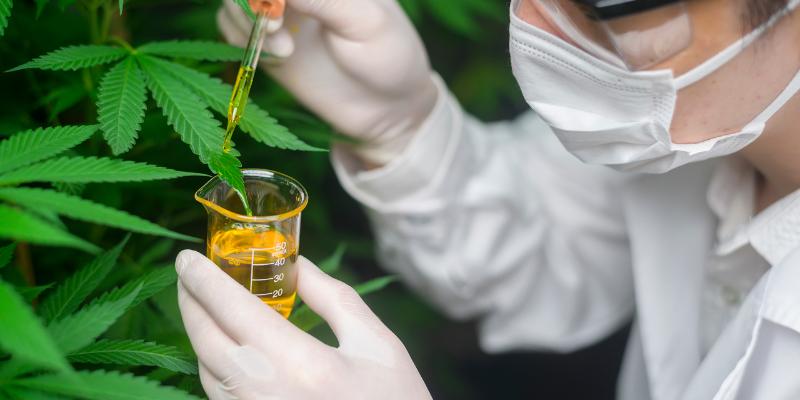
The potential of THCP could be utilized for medical purposes – especially in extreme cases of severe health problems, where patients are forced to use large doses of medical marijuana. THCP could serve as another medicinal agent, whose production would be regulated – acting as a sort of replacement for strong RSO oil, which due to its history and unstable production process cannot be recognized as a medicine.
The discovery of THCP allows for a more accurate explanation of the effective use of medical marijuana in pharmacology. So far, many arguments and therapeutic processes have been challenged by the community lobbying for the use of synthetic substitutes.
Want to start therapy with the help of medical cannabis? Consult with our doctors and trust in the knowledge and experience we have gained over the years of conducting therapy for patients with various health conditions. Join Carenabis.pl now. Schedule a consultation.
Properties, Applications, and Effects of THCP
THCP interacts with the cannabinoid receptors of the human endocannabinoid system. It plays a crucial role in regulating well-being, maintaining the body in a natural state of harmony and balance. The cannabinoid system is responsible for:
- sleep quality,
- appetite,
- motivation to work,
- occurrence of anxiety states.
Disruption of the endocannabinoid system can lead to many health issues that may impede or prevent normal functioning.
Like THC, THCP affects the CB1 receptors located in the nervous system. However, it is worth noting that THCP is a cannabinoid that also binds to CB2 receptors.
Check the price list and schedule a medical consultation with a specialist doctor now!
THCP – Research and Conclusions
A phytocannabinoid with a linear alkyl side chain containing more than five carbon atoms had never been reported as a naturally derived substance. However, our research group has revealed the presence of sevenfold homologs of CBD and Δ9-THC in the medical cannabis variety, Italian FM2, provided by the Military Chemical Pharmaceutical Institute in Florence. Two new phytocannabinoids have been isolated and fully characterized. Their configuration and structure were confirmed through stereoselective synthesis (…) The proposed names for both CBD and THC analogs are “cannabidiphorol” (CBDP) and “tetrahydrocannabiphorol” (THCP), respectively. The suffix “-phorol” derives from “sphaerophorol,” the common name for 5-heptyl-benzene-1,3-diol, which is the resorcinol molecule of both new phytocannabinoids.
Excerpts from the work: A novel phytocannabinoid isolated from Cannabis sativa L. with an in vivo cannabimimetic activity higher than Δ9-tetrahydrocannabinol: Δ9-tetrahydrocannabiphorol https://www.nature.com/articles/s41598-019-56785-1.pdf
From further parts of the study, we learn that research on mice confirmed THCP’s greater activity (than THC) at lower doses. According to the studies, the potency of THCP is up to 30 times greater than the potency of THC.
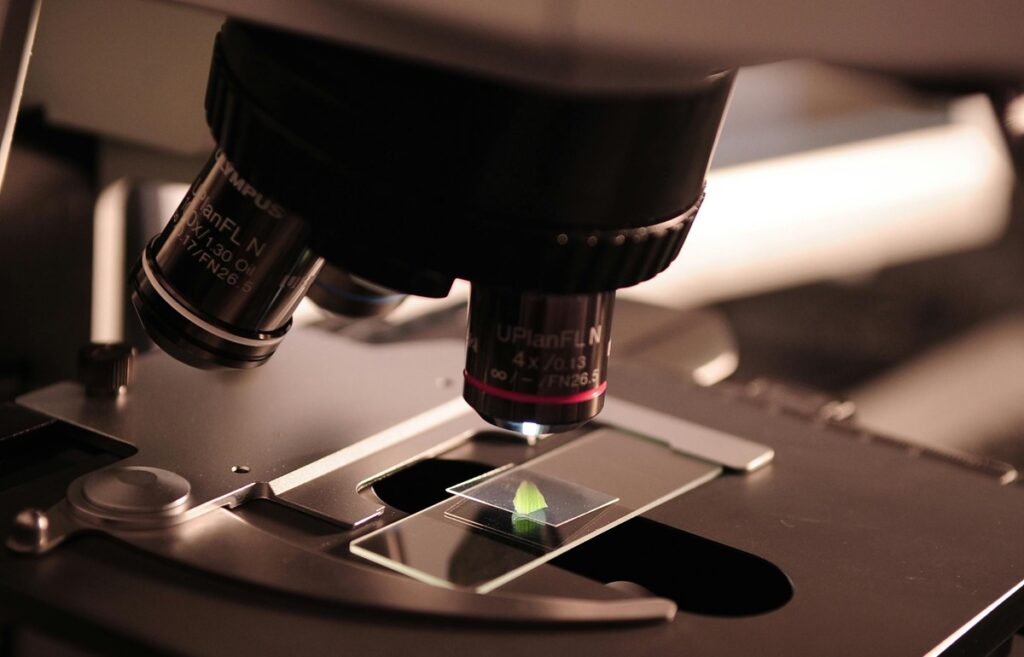
THCP – Presence and Availability
According to research by Italian scientists, THCP naturally occurs in cannabis. However, it is such a rare cannabinoid and is present in such small amounts that extracting it from the plant is not financially viable. Therefore, THCP is reproduced in laboratory conditions, using complex and advanced chemical processes. This means that when researching or purchasing products containing increased concentrations of THCP, it cannot be definitively stated that it is a fully natural cannabinoid. However, in time, it may be possible that through the genetic mixing of different strains, a type of marijuana will be created that allows for the extraction of THCP in a satisfactory and profitable process.
Patients utilizing the potential of medical marijuana should exercise caution and skepticism towards products containing THCP. Currently, this cannabinoid is too under-researched to determine its therapeutic potential. Therefore, we do not recommend investing in black market products containing THCP – both for legal and health reasons.
Utilize the medical potential of natural marijuana. Prescription cannabis is tested, and its cultivation is under strict control. It is a pharmaceutical raw material that meets the highest standards of quality and safety for use.
FAQ – Frequently Asked Questions about THCP
Is THCP safe?
THCP is a relatively new cannabinoid. It was only discovered in 2019, so it has not yet been sufficiently researched to be deemed safe. Its structure is similar to THC, but the presence of additional carbon atoms in the chain proves that even very small doses can have an extremely strong effect. Therefore, the use of products containing THCP without strict medical supervision is not recommended.
Is THCP legal?
THCP is neither an isomer nor a stereoisomer of THC. It is also not a cannabinoid classified as a controlled substance by the EU. However, it should be noted that THCP has a very similar structure to THC. There is a lack of information regarding whether it is detectable in drug tests. It also exhibits exceptionally strong psychoactive effects, even in small doses. Theoretically, it is a legal substance, available without legal restrictions, but from a practical standpoint…
Is THCP available on prescription?
THCP may be included in the cannabinoid profile of specific strains of medical marijuana, but it is not a substance directly prescribed on a prescription. It is also not listed among the pharmacological raw materials, such as medical cannabis flowers.

